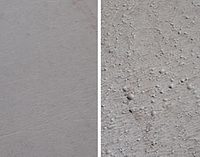Soy-Based Roofing Seals ‘Platinum' for Alberici

Soybean checkoff-funded technology is turning soybean oil into “platinum” for St. Louis-based Alberici Constructors, Inc. When building its new headquarters, the Alberici group utilized Green Products, LLC’s Environmental Liquid Membrane System (ELMS 150), a white, reflective soy-based roof coating, and Agriseal, a soy-based caulk.
With the help of these two soybean-oil-based products, along with other amendments, Alberici was able to achieve not only performance and environmental advantages, but a Platinum Level “Leadership in Energy & Environmental Design” (LEED) rating – the highest such building industry rating – shared by only nine other buildings in the world.
The LEED Green Building Rating System defines and measures sustainable design and building practices in categories that are weighted according to their relative environmental impact. By eliminating the need to dispose of the old rubber-rolled roofing on the existing building, the ELMS roofing sealant contributed six points to an overall 62 points to classify the building as a Platinum Level LEED building.
“The soy polyol formulation of the ELMS product outperforms its petroleum-based competitors, so, on top of the Platinum LEED status, the Alberici builders were able to capture the intrinsic values of soy-based technology,” says Grant Grable, Vice President of Sales and Marketing for Green Products, LLC, based in Romeoville, Ill. “Our white, reflective roofing stands up better to UV rays, allows for pooling water and is more environmentally friendly than other U.S. EPA Energy Star competitors.”
A new roof would have been a costly capital expenditure for the company. Instead, ELMS 150 was used to completely restore 72,000 square feet above the parking garage and protect the roof from the leaks experienced in the past. Grable says ELMS 150 was also more cost-competitive because the roof was restored with a single-coat application.
“The product has the added benefits of being made from regionally produced and extracted soybean oil,” says Grable. “ELMS 150 meets and exceeds UL Class A flame ratings for low slope roofing; is 100 percent resistant to mold, algae and bacteria (as third-party tested under ASTM D 3273); and carries 10-year material and labor warranties available through a national, approved-applicator network.”
In addition to ELMS 150, Agriseal biobased waterproofing caulk was used to seal multiple sections of the underground cistern used to take rooftop rainwater through a pump back into the facility to be used as gray water for toilets. It is also an environmentally friendly product, and its benefits include low volatile organic compounds (VOCs); UV resistance; stain, mildew and mold resistance; as well as outstanding elongation properties with low permeability.
For more information on ELMS 150 roof coating and Agriseal sealants, contact Grant Grable at Green Products, LLC. at ggrable@greenproducts.net. More information about LEED ratings can be found at the U.S. Green Building Council Web site at www.usgbc.org. Details about other soy-based technology can be found at www.unitedsoybean.org/newuses.

Sherwin-Williams on a Mission to Lower VOCs
With funding help from the United Soybean Board (USB) and soybean checkoff, research is under way by Sherwin-Williams to develop a low-VOC coating capable of being utilized as a protective finish with superior properties. The research project is focused on developing a safe and environmentally friendly coating that can be used as a primer or topcoat and can be easily commercialized. The soybean oil utilized in this research not only creates an environmentally friendly product but lowers viscosity as well. In initial tests, the soy-based coating demonstrated its improved adhesion abilities as well as better penetration of the substrate.Looking for a reprint of this article?
From high-res PDFs to custom plaques, order your copy today!




